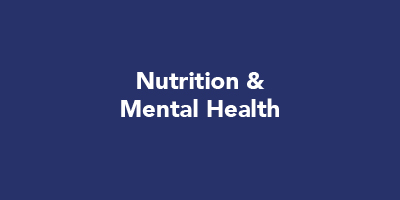
Nutrition and Mental Health
by Yvonne Mei
One in six US youth between 6-17 years old experience a mental health disorder each year.(1) Approximately half of all mental health conditions begin by age 14.(1) Mental illness during adolescents can significantly interfere with children’s ability to learn, grow, and develop.(1) Furthermore, certain mental illness can increase the risk of developing many physical health problems, such as diabetes, heart disease, and stroke.(2) Similarly, the presence of chronic conditions can increase the risk for mental illness.(2)
Mental health is a complex condition that can be affected by biological and socioeconomic factors. In turn, mental health can affect eating habits; for example, turning to sweets or highly processed snacks when feeling angry or upset.(3)
Nutrition can have a significant impact on mental health. Studies suggest that poor nutrition may be related to low mood and that improving diet has a protective effect on physical and mental health. For example, research suggests that sweets or highly processed snacks not only increases the risk of obesity, and diabetes, it may also have a detrimental effect on mental health.(4,6) Healthy eating patterns, such as those proposed in the Mediterranean diet, are linked to improved mental health.(3,4,5) Nutrients that have been linked to improved mental health include:
Omega-3 fatty acids
- Promotes and improves brain health and reduces inflammation.(5)
- Studies suggest that omega-3 may reduce depression and anxiety.(3,7)
- Oily fish -salmon, tuna, mackerel, etc.
B Vitamins (B6, folate, B12)
- B vitamins are a group of vitamins that play an important role in cell metabolism and synthesis of red blood cells.
- Deficiencies in one or more of this group of vitamins has been linked to poor mood and depression. In particular, vitamin B2, B6, B12, and folate.(6, 8)
- B2 (riboflavin) – dairy, eggs, enriched grains
- B6 – whole grain, potatoes, bananas, fish
- B12 – clams, salmon, tuna, nutritional yeast, fortified cereals
- Folate – broccoli, leafy greens, chickpeas, fortified cereals
Antioxidants
- Antioxidants are compounds that counteract the damage caused by free radicals and help protect your healthy cells.
- Studies suggest that antioxidants, such as selenium, zinc, and vitamins A, C, and E, may promote brain health and protect against anxiety, ADHD, and depression.(5,6)
- Vitamin A – orange and yellow veggies, dairy, eggs, salmon, fortified cereals
- Vitamin C – oranges, lemons, broccoli, green pepper, kale, strawberries
- Vitamin E – olive oil, nuts, seeds
- Selenium – oysters, Brazil nuts, shrimp, turkey, chicken, and eggs
- Zinc – beans, fortified cereals, chicken, whole grains, dairy
Selenium
- Selenium is an important mineral for metabolism and thyroid function. It also acts as an antioxidant.
- Low levels are associated with poorer moods.(5)
- Whole grains, fish (tuna, salmon, shrimp), eggs, baked beans
Iron
- Iron is used to make hemoglobin, a protein in red blood cells that transports oxygen from the lung to other parts of the body, and myoglobin, a protein that provides oxygen to the muscles.
- Low levels of iron are associated with poor mood, depression, fatigue, and lethargy.(6,8)
- Fortified cereals, whole grains, legumes, lentils, tofu, broccoli, nuts, dark leafy green veggies
References
- National Alliance on Mental Health. (n.d.). Mental health in schools. NAMI. Retrieved March 14, 2022, from https://www.nami.org/Advocacy/Policy-Priorities/Improving-Health/Mental-Health-in-Schools
- Centers for Disease Control and Prevention. (n.d.). About Mental Health. CDC. Retrieved March 14, 2022, from https://www.cdc.gov/mentalhealth/learn/index.htm
- McGrane, K. (2021, January 8). Nutrition and mental health: What’s the link? Medical News Today. Retrieved March 14, 2022, from https://www.medicalnewstoday.com/articles/nutrition-and-mental-health-is-there-a-link
- Firth, J., Gangwisch, J. E., Borsini, A., Wootton, R. E., & Mayer, E. A. (2020). Food and mood: How do diet and nutrition affect mental wellbeing? BMJ, m2382. https://doi.org/10.1136/bmj.m2382
- Lim, S. Y., Kim, E. J., Kim, A., Lee, H. J., Choi, H. J., & Yang, S. J. (2016). Nutritional factors affecting mental health. Clinical Nutrition Research, 5(3), 143. https://doi.org/10.7762/cnr.2016.5.3.143
- Sathyanarayana Rao, T. S., Asha, M. R., Ramesh, B. N., & Jagannatha Rao, K. S. (2008). Understanding nutrition, depression and mental illnesses. Indian Journal of Psychiatry, 50(2), 77. https://doi.org/10.4103/0019-5545.42391
- Clay, R. (2017). The link between food and mental health. Monitor on Psychology , 48(9), 26. https://www.apa.org/monitor/2017/09/food-mental-health
- Khanna, P., Chattu, V. K., & Aeri, B. T. (2019). Nutritional Aspects of Depression in Adolescents – A Systematic Review. International journal of preventive medicine, 10, 42. https://doi.org/10.4103/ijpvm.IJPVM_400_18


